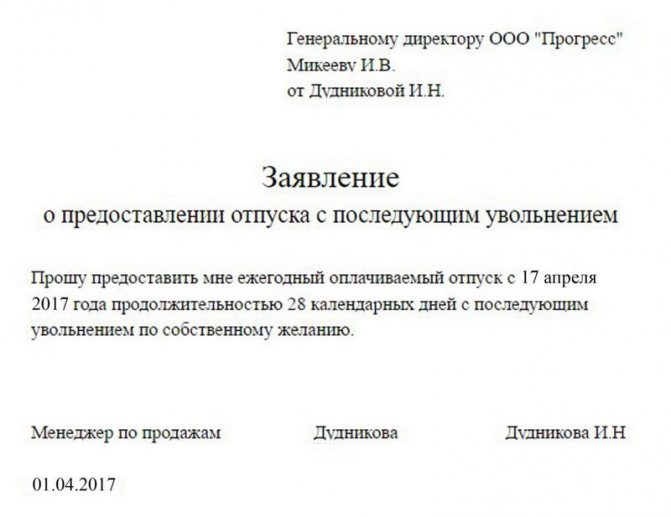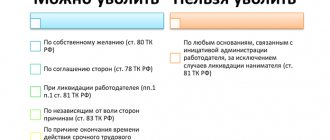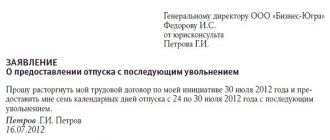Labor legislation in Russia is generally quite humane, and special attention is paid to pregnant and established mothers. This category of workers is protected from practically all work-related troubles. The biggest benefit for mothers is three-year retention of a place and provision of leave to care for children during this period. When a long vacation comes to an end and a woman must return to her professional duties, often at the first meeting with the employer she receives an offer to agree to dismissal after maternity leave.
Dismissal after maternity leave
The entire time a woman is on leave for employment and labor, and then to care for a child, she retains her job. And if the need arises, a new employee is hired in her place to temporarily perform her duties. An employer cannot fire a woman on maternity leave on his own initiative. In this case, it will not matter whether the woman is a single mother or is raising a child in a complete family. A maternity leaver can only make a decision about dismissal herself. The only exceptions are situations when a woman works under a fixed-term contract, as well as liquidation of the employer company (
Agreement of the parties and reorganization
If the pregnant woman and the employer have found compromises and come to a common opinion, then the employment contract can be terminated. You cannot agree orally without completing the appropriate documentation. The agreement is printed in two copies.
When terminating an employment contract, the employer receives a benefit for himself. The employee loses his place, position, all payments and benefits. If a reorganization is carried out at an enterprise and the owner changes, then a pregnant woman cannot be fired. Labor relations are preserved.
There are cases when, when hiring, specific deadlines are prescribed in the contract. Working under a fixed-term contract has its own requirements and rules. If a woman becomes pregnant before the end of her term, the employer is obliged to provide maternity leave. This contract is extended until the woman takes up her position. Labor relations are terminated according to the standard procedure.
Dismissal at your own request
A young mother can resign of her own free will at any time. At the same time, she also retains the obligation to work for two weeks after writing the application. Often a woman writes an application much earlier than this period, so that this two-week period of time falls at the end of maternity leave, that is, so that in fact the woman does not have time to start work. The application is drawn up in the name of the director, it is written in free form. At the same time, the main condition in writing an application is to indicate the date of dismissal and the date of drawing up the document. Nothing more is required from the employee. Here is a sample of such a statement.
Child benefit
After birth and up to one and a half years, child benefit is paid. It is 40% of average monthly earnings. This earnings are taken based on the two years that precede the payments. Non-working parents apply to the SZN service for such benefits.
The benefit is accrued upon presentation of the following documents:
- statements of the woman in labor;
- child’s birth certificate (a copy is possible);
- certificates from the second parent’s place of work confirming non-receipt of such benefits.
Calculation of compensation after dismissal: example
When dismissing a woman after maternity leave, she should be accrued certain payments (127 Labor Code of the Russian Federation). First of all, she needs to be paid compensation for her unused vacation time. In this case, the fact that the woman was on maternity leave will not matter. The payment calculation will be as follows:
First, you need to determine how much time the young mother spends working this year. For example, if she quits immediately after maternity leave, and before that she worked for less than 6 months, then she will retain the right to 14 days of vacation, for which compensation must be calculated.
After this, the time that the woman was on leave under the BiR is determined. In a normal case, the duration of such leave is 140 days, but if the birth was difficult, this period increases. For 140 days of maternity leave, the employee is entitled to 11.67 days of annual leave.
The next step is to determine the employee’s average earnings. To do this, the total amount of payments to the employee for 12 months is divided by 12 months, and then by 29.4. As a result, we will receive the amount of average daily earnings.
To determine the amount of compensation due, the amount of average daily earnings is multiplied by the number of vacation days for which the woman is entitled to compensation.
If an employee writes a letter of resignation after maternity leave, then the calculation of compensation will be different. You need to make the calculation as usual. Those days that the woman was on vacation will not be included in the calculation. And the time spent by the employee at home will not be included in the calculation.
An important point in this case will be determining the number of days of vacation required. If, for example, an employee had already used her allotted leave before dismissal, then she will not be compensated (
What documents does a maternity worker need upon dismissal?
The organization receives a letter of resignation from a woman on maternity leave. On the last day of work at this enterprise, a woman must receive:
- work book with the corresponding entry;
- 2-NDFL certificates requested for certain years of work;
- copies of orders;
- cash payments, including compensation for unused vacations.
If you require documents that are outside the mandatory list, you should write an application for their issuance.
The procedure for payments to women on maternity leave is regulated by Federal Law No. 255 of December 29, 2006.
A woman on maternity leave is entitled to receive payments calculated on the basis of the average salary based on the results of a two-year period of work before going on maternity leave, taking into account the established minimum wage (minimum monthly wage), which from January 1, 2019. equal to 11,280 rubles.
Maternity benefits are paid in one lump sum and in total. The company's accounting department is provided with a sick leave certificate received at the antenatal clinic at 30 weeks of pregnancy.
If a woman quits before the deadline for receiving sick leave, then at this enterprise she loses the opportunity to receive payments.
If the dismissal occurs immediately after childbirth, then the mother receives only the first part of the benefit at this enterprise (on average for 70 calendar days). She will receive the second part of the benefit at the new enterprise or at the social security authorities.
If a woman nevertheless decides to leave on maternity leave of her own free will and a more profitable job does not await her, it is better to receive all parts of the benefit at her enterprise and write a letter of resignation on the last day of maternity leave.
In order not to wait until the provisions provided for in Part 1 of Art. 80 Labor Code of Russia 2 weeks, the parties can provide for this situation in advance in the employment contract. In particular, the contract may stipulate that when submitting a resignation letter, you do not need to wait 2 weeks to complete the work, and the day of dismissal is considered the day the application was submitted or another date specified in the application.
It is also possible not to wait 2 weeks for dismissal if the employee is unable to continue working - for example, if he needs to start training, needs to leave due to a change of residence, etc. Also, immediate dismissal may be due to the fact that it was officially established that the employer violated the terms of the contract or labor legislation. Then, in accordance with Part 3 of Art. 80 of the Labor Code of Russia, dismissal at one’s own request must be made on the day specified in the employee’s application.
Another option is dismissal by agreement of the parties, the possibility of which is provided for in Art. 78 TK. By virtue of the norm, employment relations on this basis can be terminated at any time - the main thing is that neither the employer nor the employee objects to this.
Before going on maternity leave, a woman can work not one, but two jobs or change jobs over the past two years.
If a woman has been insured for the last two years in both organizations, then, according to Article 13 of Federal Law No. 255, maternity benefits will be calculated from two places of official employment.
If a maternity leaver changes employer, this cannot affect the benefit, since data for the last two years is taken into account.
Article 81 of the Labor Code of the Russian Federation does not allow an employer to dismiss a woman on maternity leave without her initiative. But it happens that a mother returns to work after a three-year vacation, but her place is taken, and the employer does not want to fire the new employee.
You need to know that according to the law, there are three options for dismissal:
- at your own request;
- on agreement of the parties;
- on staff reduction.
According to Article 256 of the Labor Code of the Russian Federation, management cannot dismiss an employee who interrupted her work activity due to the birth of a child. Therefore, when she returns to work, her position should be vacant.
Dismissal due to liquidation of the enterprise must be reported in writing against signature two months before the termination of the employment relationship.

Maternity leave in common parlance is the period when a woman does not work, but is engaged in giving birth and raising a child. According to Art. 255, 256 of the Labor Code of the Russian Federation, the maximum possible period for this is 70 days before the birth of the child and 3 years from the date of his birth. In case of multiple pregnancy, the period increases by 2 weeks.
We suggest you read: Accepted inheritance but did not formalize it
During this time, the state guarantees the following privileges to an officially employed mother:
- paid sick leave for pregnancy and childbirth;
- parental leave for up to one and a half years, paid at 40% of salary;
- further leave until the child’s third birthday with a monthly payment of 50 rubles;
- safety of place of work and position;
- the ability to take maternity leave in parts, notifying the enterprise’s personnel service in advance;
- impossibility of dismissal in any case other than the complete liquidation of the organization;
- termination of an employment agreement on personal initiative from any day convenient for her.
Reference! A pregnant woman can be fired only if the main employee quits, in whose absence she temporarily performed his duties. A prerequisite for this is that the employer has no vacant positions or the woman refuses the offer of another job.
If a woman returns to work before the end of maternity leave, then the administration of the enterprise cannot fire her against her own will until the child turns 3 years old. The exception is gross violations of labor discipline and failure to fulfill one's duties.
After the child turns 3 years old, legally the mother’s labor rights become the same as all the rights of the organization’s employees. In fact, a woman becomes an inconvenient employee for an enterprise or individual entrepreneur whose production activities did not stop during her absence. Inevitable partial professional degradation, possible frequent illnesses of a small child, the need to fire a well-performing temporary employee when the main employee returns from maternity leave - these are part of the arguments not in favor of the young mother.
You can terminate an employment contract with a woman after she returns from maternity leave on any of the grounds provided for in Art. 77 Labor Code of the Russian Federation. Some of them are rarely encountered in practice, but there are standard dismissal options.
Dismissal for this reason is the leading option among all options. Applies when termination of the contract is initiated by a woman. Article 80 of the Labor Code of the Russian Federation establishes the rules for such dismissal:
- the employer is notified in the form of a written statement at least 2 weeks before the date of dismissal;
- the two-week period begins to run after the day of registration of the application;
- it is possible to change your decision and withdraw your application before the date of dismissal, if another person has not already been invited in writing to take the woman’s place;
- termination of the contract is possible earlier than the specified period if the woman cannot continue working, for example due to enrollment in a university, or when the employer violates labor laws;
- The work book is issued on the last working day.
If for some reason the documents necessary for dismissal are not issued, and the employee does not insist on dismissal, then the employment contract is considered not terminated. Its action continues under the same conditions.
There are official ways of dismissal without work. You can submit your application 2 weeks before your child turns 3 years old. Another option is to request annual leave, followed by dismissal, if there is unused vacation.
When a woman goes to work, different situations may arise. If it happens that a woman does not want to stay in this job, and the administration has a candidate to take her place, then the best option would be dismissal under Art. 78 Labor Code of the Russian Federation.
In the event of dismissal by agreement, each party receives the desired result, so it is agreed upon from any date, even from the end of maternity leave.
Dismissal of a person under Article 81 of the Labor Code of the Russian Federation requires a compelling reason: inadequacy for the position held, repeated violations of labor regulations, failure to perform work duties, appearing in a state of intoxication, committing an immoral offense, theft of property. If the employer wants to part with an employee, it will not be difficult for him to find a suitable reason for terminating the employment contract.
The claims made by the administration must be recorded and proven. For example, insufficient qualifications are confirmed by certification results, the fact of theft is confirmed by an act of a specially created commission, frequent lateness to work is confirmed by a working time log.

In case of violations of discipline and failure to fulfill labor duties, the woman is required to provide an explanatory note for each case. The employer then issues an order to dismiss the employee, stating the reason.
An employer does not always have the right to dismiss an employee who does not suit him if there is evidence of his insufficient qualifications or inadequacy for the position held.
In accordance with Art. 261 of the Labor Code of the Russian Federation protect women from dismissal:
- raising a young child alone;
- who are single mothers with a disabled minor child;
- having 3 or more young children, one of whom is less than 3 years old, if her husband is officially unemployed;
- who have a disabled child under 18 years of age and a spouse who is not employed.
We suggest that you familiarize yourself with: The procedure for dismissal due to job reduction
It is possible to terminate an employment contract with such women only if the enterprise is liquidated, they commit serious offenses, or repeated violations of labor discipline.
Reduction of numbers or staff is carried out according to a long, labor-intensive, established procedure and is not intended to fire the young mother specifically. According to Art. 179 of the Labor Code of the Russian Federation, she has a greater chance of staying at work if her level of qualifications and labor productivity are higher than those of others.
Dismissal after maternity leave
An employer has no right to dismiss a woman with a child under 3 years of age on his own initiative. However, in some cases this may be possible. For example, if a fixed-term employment contract was concluded with a young mother. In this case, the woman has the right to extend it at her own request for the entire period of her pregnancy. To do this, she writes applications and submits them to the employer every 3 months. If no application is received from the woman, then the employer has the right to dismiss her. Immediately after giving birth, the manager can also dismiss the employee unilaterally, on the basis that maternity leave has no effect on the extension of a fixed-term contract. To dismiss the employer, it is enough to notify the woman about this 3 days before the dismissal. The woman must be notified in writing (
How to make an application
The application must be drawn up by hand or using technical means. There is no set form for such paper.
Remember! It is mandatory to indicate:
- name of the addressee - the head of the enterprise;
- employee details;
- an explanation of the reason why she quits - on her own initiative;
- date of dismissal (no earlier than two weeks after submitting the application);
- date of writing the document;
- signature of the applicant.
If the matter concerns a remote employee, drawing up a paper application and affixing a personal signature is not necessary.
In such a situation, the Labor Code provides for the possibility of exchanging electronic documentation, which is certified by both parties using an electronic signature.
Other conditions for the care of a woman on maternity leave who works remotely do not differ from the general ones.
Application for leave and dismissal
In one of the previous articles, we examined the issue of the need to draw up a vacation application and came to the conclusion that it is necessary to write it if the vacation schedule has not been approved. But this applies to cases when an employee plans to return to work after vacation. If leave is taken before dismissal, it is necessary to take an application from the employee . This is directly stated in Article 127 of the Labor Code.
So, the employee must write an application addressed to the manager, in which he sets out his request for leave from a certain date . The application must also indicate that the leave is taken before dismissal of one's own free will . The application form is not regulated, but you can use the following example:










